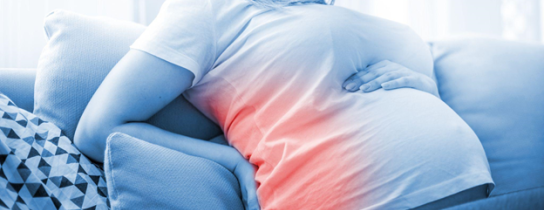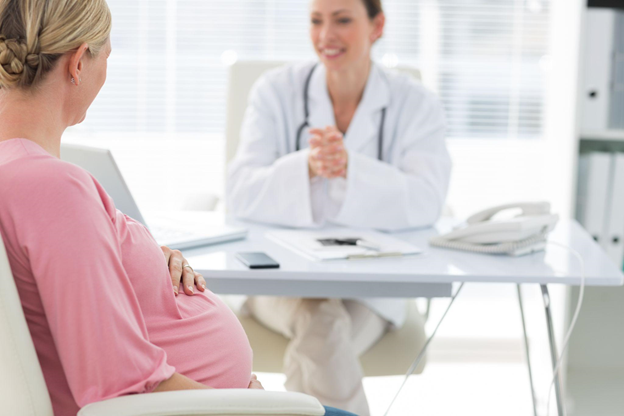
How to Manage Chronic Back Pain During Pregnancy
If you’re pregnant and experiencing back pain, you’re not alone; as many as two-thirds of women experience varying degrees of back pain during their pregnancies.1 The good news is that you don’t have to suffer until your baby is born; there are many options for managing your chronic back pain.
What Is Chronic Pregnancy Back Pain and Why Does It Occur?
Chronic back pain is any back pain that continues for an extended period of time. Some women who experience back pain do so from the beginning of their pregnancy to the time they give birth. Other women may experience back pain only during a particular trimester.
As your baby grows, you will experience both physical and hormonal changes during pregnancy. Some of these changes can contribute to your back pain. Weight gain can affect postural changes which result in your center of gravity shifting. Uterine expansion can cause rectus abdominis muscle separation, which can contribute to back pain as well. The relaxing of your pelvic ligaments and emotional stress can also affect how your back feels.
Types of Back Pain During Pregnancy
Women can experience back pain, as well as other forms of secondary pain, at any point and in any trimester. In addition to your back and spine, you can also feel pain in any of the following areas:
- Lower back
- Pelvis
- Thighs
- Hips
- Legs
Lower Back Pain
Lower back pain can be the result of increased spinal curvature, which occurs in response to the increasing weight of your baby. This pain in the lower back can worsen when the hip muscle shortens in response to increased curving of the spine.
Uterine expansion can place pressure on the vena cava, which is a major blood vessel that runs along your vertebrae to your pelvis. This increased pressure can lead to more intense lower back pain during sleeping or when lying down.
Posterior Pelvic Pain
Pain in the pelvic area is due to the amount of laxity in the hip joints. These joints connect the pelvis and the spine. If they become very soft (also known as high laxity), pelvic pain can result from the displacement of the sacroiliac joint.
Thigh Pain
Pain in the thighs can occur via the process of the compression of peripheral nerves. This occurs as the result of uterine growth, which can add pressure and swell soft tissues and can cause nerve compression. Therefore, pregnant women may experience symptoms like buzzing, burning, or a cold feeling in their thighs.
Hip Pain
Pelvic and lower back changes, caused by having to bear excess weight, can result in pregnant women experiencing pain in various parts of their hips, which can lead to alignment problems as well as the destruction of bone tissue at the head of the hip joint.
Leg Pain
The additional stress and compression placed on the pelvis, thighs, and hips can cause pain to radiate to the legs. Leg pain during pregnancy can be temporary but can also last throughout the pregnancy if it is left untreated.
Tips for Living with Chronic Pregnancy Pain

Women who are experiencing back pain during their pregnancies have several options for prevention, management, and treatment.
How to Prevent Back Pain
You may be able to prevent or minimize your pregnancy back pain by incorporating any or all of the strategies listed below:
- Performing health care provider-approved exercises to support back and abdominal muscles
- Stretching your back on a regular basis
- Sleeping on your side whenever possible
- Receiving chiropractic treatments to maintain alignment of your hips, back, and pelvis
- Wearing a device on your lower abdomen for support
- Keeping your stress in check to prevent additional discomfort and pain during stressful periods
- Ensuring you elevate your feet regularly to relieve back strain
Some Chronic Back Pain Treatment Options
Chronic back pain can be treated using a wide range of solutions that include both pharmaceutical and non-pharmaceutical options. You can treat your back pain by trying any of the following:
- Different sleeping positions
- A pregnancy support pillow while sleeping
- Shoes with low heels that fit comfortably and offer arch support
- Heating pad on the lowest setting for a limited time after 1st trimester or warm water bottle
- Cold compresses
- Massage therapy
- Squatting instead of bending over to pick items up from the floor
- Acetaminophen (Tylenol) if approved by your doctor
- A back brace
When Should You See a Doctor for Pregnancy Back Pain?

Experiencing back pain without other symptoms doesn’t typically warrant a call to your doctor. However, certain types of back pain and symptoms can indicate the development of more serious problems. You should make an appointment if you are experiencing:
- Rhythmic cramping, which can indicate preterm labor
- Back, thigh, leg, or hip pain that persists, despite attempting to treat your pain with the above strategies
- A sudden increase in back pain or severe pain that occurs suddenly or becomes increasingly severe, as this may be related to a serious condition called septic arthritis, or another condition requiring immediate medical care
- “Pins and needles” in the extremities or problems urinating, which can indicate that nerves and blood vessels are being put under pressure
Crystal Run Healthcare has several locations for Women’s Health across the Hudson Valley, which allow for easy access to our health system from your home or work. Our highly-trainedOBGYNs offer a full range of prenatal and obstetrical care to support you through a safe and healthy pregnancy.
Source:

 Optum Radiology at Crystal Run Healthcare
Optum Radiology at Crystal Run Healthcare Same and next-day pediatric appointments
Same and next-day pediatric appointments